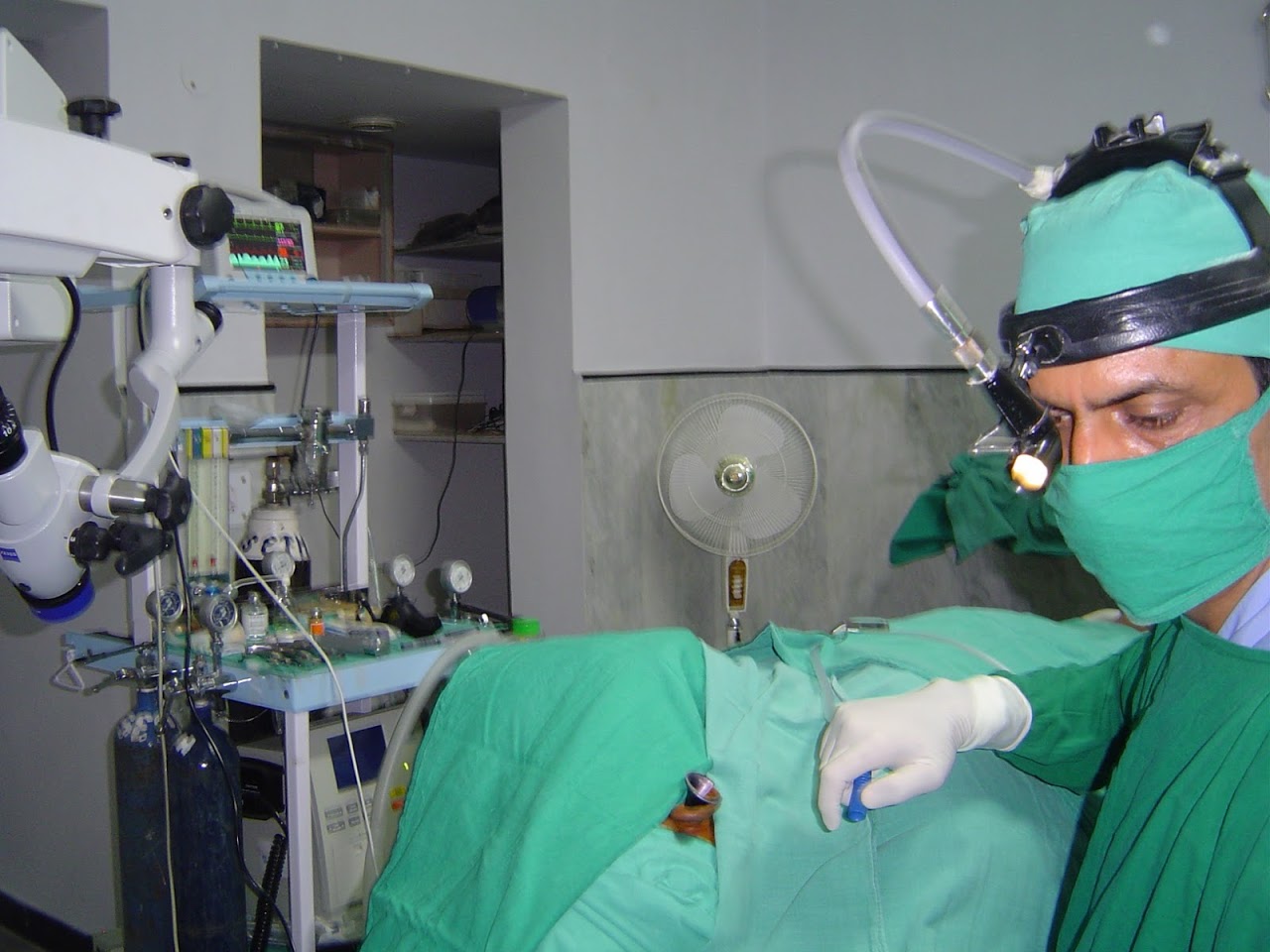
ENT Surgery
From basic to advanced, all ENT Surgeries are offered at the Centre. We partner with some of the leading hospitals in South Delhi for panel patients.
Dr Bhardwaj is a senior well trained ENT Surgeon. All routine ENT surgeries are performed by him, including Adenoid removal, Tonsillectomy, Microlaryngeal Surgery, Ear surgeries including Mastoidectomy, Tympanoplasty, Septoplasty, Endoscopic Sinus Surgery etc.
What We Do
Medfirst - The Best ENT Surgery Centre in Delhi
Welcome to our world-class ENT surgery center, where we prioritize your well-being above all else. Our team of expert ENT surgeons is committed to delivering top-notch care, specializing in a wide range of procedures. Whether it’s sinus surgery, tonsillectomy, or other complex ENT surgeries, you can trust our experienced surgeons to provide exceptional results. As the best clinic in the region, we take pride in delivering personalized care and achieving optimal outcomes for our patients. Your health is our priority, and we’re dedicated to helping you breathe, hear, and live better.
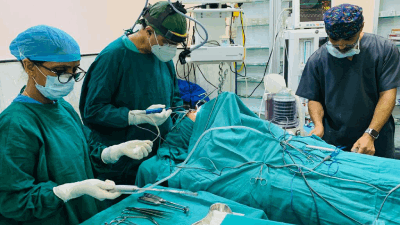
Tonsillectomy
Relieving chronic tonsillitis and breathing problems through surgical removal.

Adenoidectomy
Removing adenoids to treat infections, breathing issues, and ear infections.
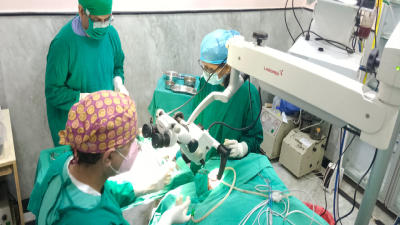
Myringoplasty
Repairing eardrum or middle ear damage to improve hearing and reduce infection risk.
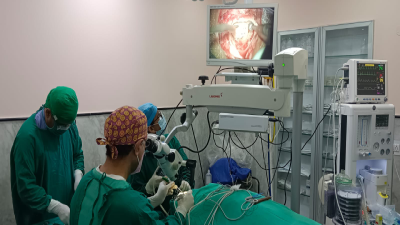
Myringotomy
Myringotomy is a surgical procedure for middle ear fluid buildup, relieving pressure and improving ventilation.
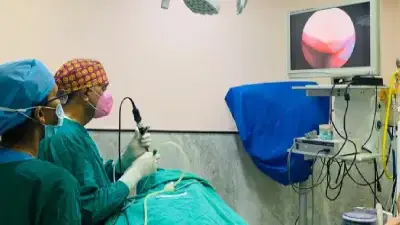
Septoplasty
Septoplasty: Correcting Deviated Nasal Septum for Improved Breathing and Reduced Symptoms.
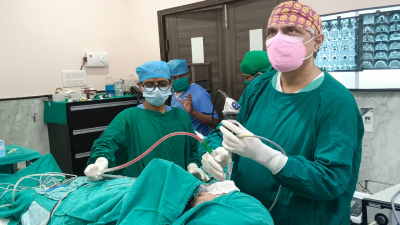
Turbinectomy
Turbinectomy - Surgical removal of nasal turbinates to improve airflow and filtration function.
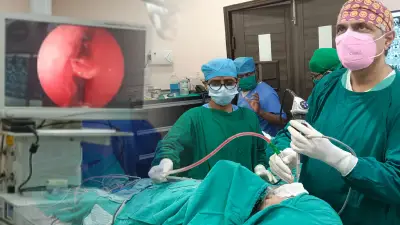
FESS
FESS are surgeries for sinus diseases, improving drainage and treating nasal polyps and tumors.
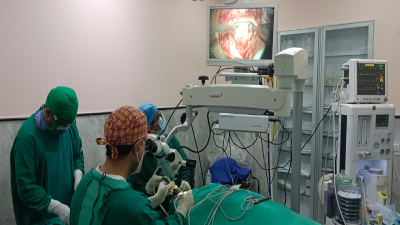
Nasal Polypectomy
Nasal Polypectomy: Surgical removal of nasal polyps causing obstruction, discharge, and loss of smell.
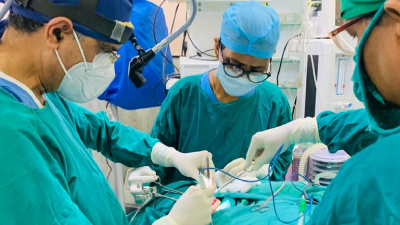
Snoring & Sleep Apnea Surgery
Surgery for sleep-related breathing disorders like snoring and obstructive sleep apnea.
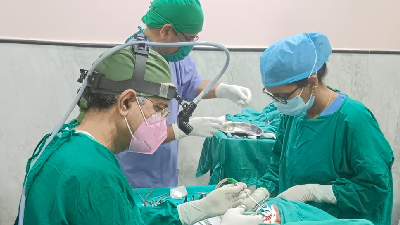
Mastoidectomy
For removal of infected mastoid bone to treat complications like mastoiditis and cholesteatoma.

MLS
Microlaryngeal surgery (MLS) treats deep throat swelling or growth without external incisions under general anesthesia.
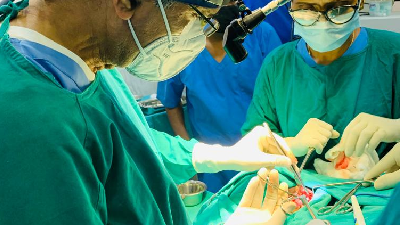
Removal of Neck Swelling
Neck Swelling Removal , including lymph nodes, glands, and cysts, with anesthesia tailored to the size, location, and patient's preference.
Insurance and TPA for ENT Surgeries
At MedFirst ENT Centre, we prioritize our patients’ well-being and strive to make their healthcare journey as smooth as possible. We understand that managing medical expenses and insurance can be a concern for many individuals. That’s why we have partnered with a trusted Third-Party Administrator (TPA) to offer you a hassle-free and efficient way to handle your insurance claims.
We understand the significance of Health Policy in your medical journey. If you’re among those fortunate individuals with Health Policy coverage, you’ll be pleased to know that we offer an array of state-of-the-art ENT surgeries, including but not limited to sinus surgery, tonsillectomy, and adenoidectomy. We are proud to provide a seamless, cashless experience, ensuring that your health policy takes care of the financial aspects, allowing you to focus on your well-being.
With our Insurance and TPA support, you can rest assured that your ENT surgery expenses will be efficiently managed, allowing you to focus on your health and recovery. Our experienced team will work closely with your insurance providers and TPAs to handle all paperwork and approvals, minimizing any administrative burden on your end.
Address
D 3/14, Ground Floor
Vasant Vihar
New Delhi 110 057
Mobile: +91 98711 50032
Hour of Operation
Monday To Saturday
Morning Timing
09:30 AM to 12:30 AM
Evening Timings
3:30 PM to 6:00 PM
Thursday Morning Clinic Is Closed
Thursday Evening
3:30 PM to 6:00 PM
Let's Get In Touch. Contact us.
Get Connected
Frequently Asked Questions (FAQ)- ENT Surgery
ENT (ear, nose, and throat) surgery, also known as otorhinolaryngology surgery, involves procedures that treat conditions affecting the head and neck region, including the ears, nose, throat, and sinuses. Some of the most common ENT surgeries include:
- Tonsillectomy: This surgical procedure involves the removal of the tonsils, which are two small glands located at the back of the throat. Tonsillectomy is often performed to treat recurrent tonsillitis or sleep-disordered breathing.
- Adenoidectomy: Adenoids are small glands located in the back of the nasal cavity. Adenoidectomy is a surgical procedure that involves the removal of these glands, usually to treat recurrent infections or breathing difficulties.
- Sinus surgery: This type of surgery is performed to treat chronic sinusitis, which is a condition that causes inflammation and swelling of the sinuses. Sinus surgery involves removing blockages or correcting structural problems that prevent proper drainage of the sinuses.
- Septoplasty: This surgical procedure is used to correct a deviated septum, which is a condition in which the thin wall between the nostrils is displaced to one side, causing breathing difficulties.
- Myringotomy: This is a surgical procedure that involves making a small incision in the eardrum to relieve pressure and fluid buildup in the middle ear. A small tube may be inserted to help drain the fluid.
- Cochlear implant surgery: This procedure is performed to treat severe hearing loss or deafness. It involves implanting a small device that stimulates the auditory nerve to help the patient hear better.
ENT surgeons, or otolaryngologists, perform a wide range of surgical procedures related to the ears, nose, and throat. Some of the most common ENT surgeries include tonsillectomy, adenoidectomy, sinus surgery, ear tube insertion, thyroidectomy, and vocal cord surgery. The specific surgeries performed by an ENT surgeon will depend on their training, experience, and expertise in a particular area of ENT medicine.
Before getting ENT surgery done, there are several important things that should be kept in mind to ensure a safe and successful outcome. Here are some of the key considerations:
- Choose an experienced surgeon: Make sure your surgeon is qualified and experienced in performing the specific type of ENT surgery you need.
- Discuss the risks and benefits: Talk to your surgeon about the risks and benefits of the surgery, as well as any alternative treatment options that may be available.
- Follow pre-operative instructions: Your surgeon will provide you with specific instructions to follow before the surgery, such as fasting or avoiding certain medications. It is important to follow these instructions carefully to ensure a safe and successful surgery.
- Arrange for post-operative care: You may need to arrange for someone to drive you home after the surgery and help you with basic activities of daily living during your recovery period.
- Understand the recovery process: Ask your surgeon about the expected recovery time and any restrictions or limitations you will need to follow during the healing process.
- Inform your surgeon of any medical conditions: Be sure to inform your surgeon of any medical conditions you have or medications you are taking, as these can impact the safety and effectiveness of the surgery.
- Quit smoking: If you smoke, it is recommended that you quit before the surgery, as smoking can increase the risk of complications during and after surgery.
By keeping these considerations in mind and working closely with your surgeon, you can help ensure a safe and successful outcome from your ENT surgery.
Finding a good ENT surgeon involves several steps, including researching the surgeon’s credentials, experience, and reputation. Patients can start by asking for referrals from their primary care physician or trusted friends and family members. Online reviews and patient testimonials can also be a helpful resource for evaluating a surgeon’s reputation. Before scheduling a consultation, patients should review the surgeon’s education and training, as well as their board certification and experience in performing the specific type of ENT surgery needed. Finally, patients should ask questions and communicate openly with the surgeon to ensure they feel comfortable and confident in their care.
To determine which surgeon is suitable for your ENT surgery, consider their experience, expertise, and reputation. Ask about their training and certification in the specific type of surgery you need. Review their success rates, complication rates, and patient satisfaction scores. Ask for referrals from your primary care doctor or trusted friends and family members. Finally, communicate openly with the surgeon and ask any questions you may have to ensure you feel comfortable and confident in their care. Ultimately, the best surgeon for your ENT surgery is one who has the necessary skills, experience, and expertise to provide safe and effective treatment tailored to your individual needs.
When choosing a hospital for your ENT surgery, consider factors such as the hospital’s reputation, experience, and accreditation. Look for a hospital that specializes in ENT care and has a team of experienced and qualified surgeons, anesthesiologists, and nurses. Consider the hospital’s safety record, infection rates, and patient satisfaction scores. Research the hospital’s facilities, including the availability of advanced technology and specialized equipment. Finally, communicate openly with your surgeon about which hospital they recommend based on your specific needs and the type of surgery you require.
After ENT surgery, it is important to follow your surgeon’s post-operative instructions to minimize the risk of complications and promote healing. This may include taking medications as prescribed, avoiding certain activities or foods, and keeping the surgical site clean and dry. You may also need to avoid blowing your nose, smoking, or drinking alcohol for a period of time. Follow-up appointments with your surgeon are typically scheduled to monitor your recovery and ensure that any issues are addressed promptly. Be sure to communicate with your surgeon if you experience any unexpected symptoms or concerns during your recovery.
The cost of ENT surgery can vary widely depending on several factors, such as the type of surgery, the surgeon’s experience and qualifications, and the geographic location of the hospital or surgery center. Patients should check with their insurance provider to determine their coverage and out-of-pocket costs. Factors such as the patient’s age, overall health, and any medical complications may also impact the total cost of ENT surgery.
The length of hospitalization for ENT surgery varies depending on the type and complexity of the surgery. Some procedures may be done on an outpatient basis, while others may require a hospital stay ranging from a few hours to several days.
In many cases, third-party insurance can cover the cost of ENT surgery. However, the exact coverage and benefits will depend on the specific insurance plan and policy. Patients should check with their insurance provider to determine their coverage for ENT surgery, including any deductibles, co-pays, or out-of-pocket costs. Patients may also need to obtain prior authorization from their insurance company before undergoing surgery to ensure that the procedure is covered under their policy.
To determine if your specific ENT surgery is covered by your insurance company, you can review your policy documents or contact your insurance provider directly. Ask about the coverage for your specific type of surgery, including any limitations or exclusions. You may need to provide information about the surgery, such as the specific procedure code or the diagnosis code, to determine coverage. If you are unsure or have questions about your coverage, it is always best to speak directly with your insurance provider to obtain the necessary information.
In some cases, loan facilities may be available to help cover the cost of ENT surgery. Patients can explore financing options such as personal loans, credit cards, or medical loans to pay for the procedure. Some hospitals or surgery centers may also offer financing options or payment plans to help patients manage the cost of surgery. However, patients should be aware that taking out a loan to pay for surgery will result in additional expenses due to interest and fees, and should carefully consider their ability to repay the loan before making a decision.
Yes, both government and private employees may be eligible for insurance coverage for their ENT surgery through their employer-provided health insurance plans. Many employers offer group health insurance plans that cover a range of medical procedures, including ENT surgery. The specific coverage and benefits will depend on the insurance plan and policy offered by the employer. Employees should review their policy documents or contact their employer’s human resources department to determine their coverage for ENT surgery and any out-of-pocket costs or deductibles that may apply.

Get In Touch
Subscribe For Health Updates


- © 2023 MedFirst ENT Centre
